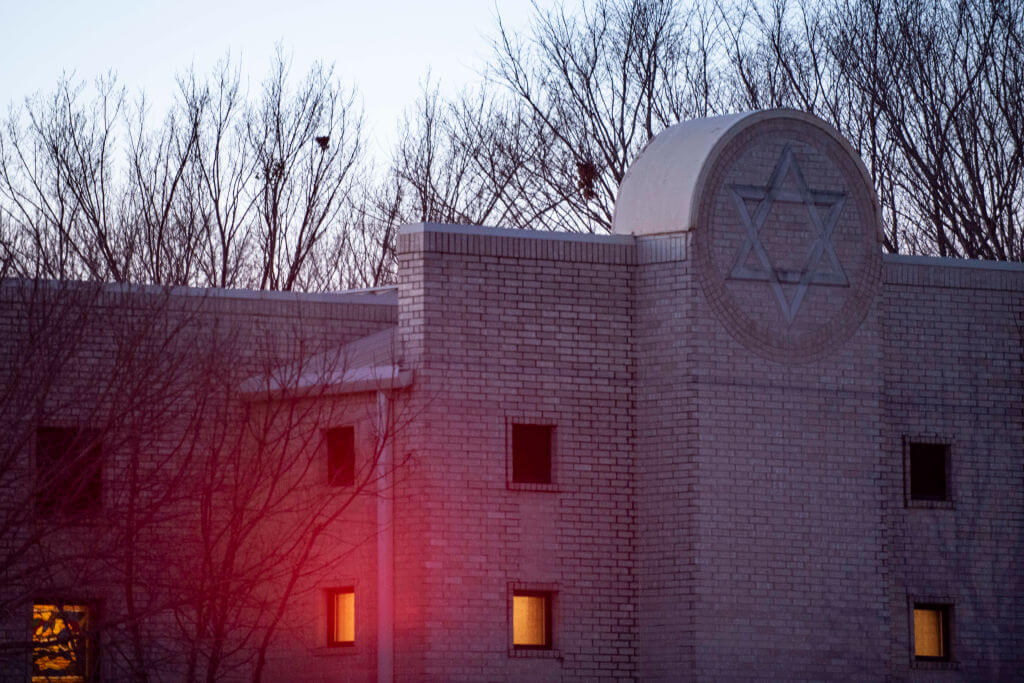Jewish groups sound alarm ahead of synagogue hostage standoff anniversary

Congregation Beth Israel synagogue is shown on January 17, 2022 in Colleyville, Texas, after a man held hostage the rabbi and several congregants. Photo by Getty Images
This article originally appeared on Haaretz, and was reprinted here with permission. Sign up here to get Haaretz’s free Daily Brief newsletter delivered to your inbox.
U.S. Jewish groups are sounding the alarm on the effects of rising antisemitism on American Jews’ sense of safety ahead of the one-year anniversary of a hostage standoff at a Texas synagogue.
The American Jewish Committee, which is to release a survey comparing U.S. Jews’ and other U.S. adults’ opinions on the state of antisemitism in the U.S., said 87% of U.S. Jews who were aware of the incident felt less safe after it took place. The hostage-taking a year ago saw a gun-wielding man take hostages at Congregation Beth Israel in Colleyville, a suburb of Dallas. The standoff ended after Rabbi Charlie Cytron-Walker managed to help his fellow hostages escape.
“The Colleyville attack clearly reverberated throughout the Jewish community,” said AJC CEO Ted Deutch. “No Jew should ever feel unsafe anywhere, anytime in America simply because they are Jewish. As we have seen on a local and national level, these antisemitic incidents don’t happen in a vacuum. They are rooted in an age-old hatred that cannot go unchecked.”
AJC’s also found that younger Jews are more concerned about their physical safety than older Jews, and that Jewish adults belonging to a religious denomination are more concerned about their physical safety than secular Jews. Furthermore, the survey found that U.S. Jews were acutely more aware of the Colleyville incident than other U.S. adults, despite significant media coverage of the incident.
The Anti-Defamation League, in its own findings, stated that 85 percent of Americans believe in at least one anti-Jewish trope and 20 percent believe in at least six tropes. These are the highest levels the ADL has measured in decades.
“Those of us on the front lines have expected such results for a while now — and yet the data are still stunning and sobering: there is an alarming increase in antisemitic views and hatred across nearly every metric — at levels unseen for decades,” said ADL CEO Jonathan Greenblatt.
The findings come as second gentleman Doug Emhoff, who has become the face of the Biden administration’s efforts to combat antisemitism, announced he will travel to Poland and Germany later this month as part of his efforts and to support Holocaust remembrance.
Emhoff, the first Jewish spouse of a U.S. president or vice president, will begin his trip in Krakow, from where he will visit the Auschwitz-Birkenau Memorial and Museum to commemorate International Holocaust Remembrance Day, January 27, alongside U.S. special antisemitism envoy Deborah Lipstadt.
The vice president’s husband, who will also meet with Congressional leaders focusing on combating antisemitism prior to his trip, will then head to Berlin, where he and Lipstadt will attend a convening of special envoys and coordinators working to combat antisemitism. Emhoff will also meet with local Jewish communities and officials and visit historical and cultural sites in both Krakow and Berlin.
Over the past several weeks, U.S. President Joe Biden has reaffirmed his administration’s commitment to fighting antisemitism, establishing an interagency group after U.S. Jewish leaders raised concerns during a meeting headed by Emhoff.
Antisemitism has spiked in recent months following Elon Musk’s Twitter takeover, with conspiracy theories platformed by celebrities like Kanye West and Kyrie Irving, as well as Donald Trump’s association with avowed Holocaust denier Nick Fuentes, dominating headlines.
Correction: An earlier version of this story mistakenly reported that an American Jewish Committee survey found that 87% of U.S. Jews felt less safe after the Texas hostage-taking. The survey actually shows that 87% of U.S. Jews who were aware of the hostage-taking felt less safe.

I hope you appreciated this article. Before you go, I’d like to ask you to please support the Forward’s award-winning journalism this Passover.
In this age of misinformation, our work is needed like never before. We report on the news that matters most to American Jews, driven by truth, not ideology.
At a time when newsrooms are closing or cutting back, the Forward has removed its paywall. That means for the first time in our 126-year history, Forward journalism is free to everyone, everywhere. With an ongoing war, rising antisemitism, and a flood of disinformation that may affect the upcoming election, we believe that free and open access to Jewish journalism is imperative.
Readers like you make it all possible. Right now, we’re in the middle of our Passover Pledge Drive and we still need 300 people to step up and make a gift to sustain our trustworthy, independent journalism.
Make a gift of any size and become a Forward member today. You’ll support our mission to tell the American Jewish story fully and fairly.
— Rachel Fishman Feddersen, Publisher and CEO
Join our mission to tell the Jewish story fully and fairly.
Only 300 more gifts needed by April 30






















